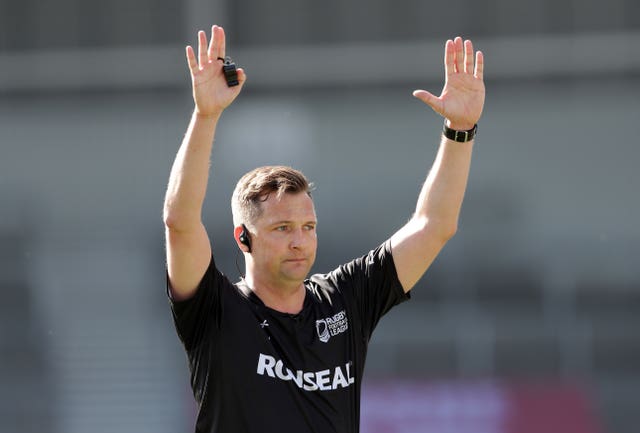
Former Super League referee Ben Thaler says social media is making life “intolerable” for top officials and called for more education on the potential long-term consequences of posting messages and photographs online.
Thaler, 43, brought his two-decade officiating career to an end in September after 441 top-flight matches, although he will assume the whistle one more time on Sunday when he referees the unique hybrid match at Headingley to raise funds to research and support those living with Motor Neurone Disease.
Thaler was prominent enough in his prime to earn the dubious privilege of a fake social media account, and endured an eight-week ban after being falsely accused of criticising a fellow official – something whose repercussions he accepts he will never be able to avoid.
The suspension of football referee David Coote this week following derogatory comments he appeared to make about ex-Liverpool boss Jurgen Klopp will have served as a high-profile wake-up call to prominent officials across a wide range of sports of the fine lines they need to tread.

Thaler, who is still a full-time video referee with the Rugby Football League with a remit to nurture the next generation of match officials, said: “When I started there was no such thing as social media, and it is something that can make the job intolerable really.
“The personal attacks only have a detrimental effect and the well-being of the official has to be taken into account.
“Several of my colleagues have had death threats and I’ve had my share of them myself. Some have gone to an extreme and you have to be so careful these days with what you do and say.
“If you’re a rugby league referee and you have a picture taken with a player on a night out and it ends up on social media, 10 years down the line you might be refereeing this guy in a Challenge Cup final and you might give a 50-50 decision.
“Someone could trawl back 10 years on social media and find something that’s completely innocent, and have a completely different perception of it. But it’s only a picture and it doesn’t tell the full story.
“We need to educate people more. I seriously think that by educating people there will be a greater understanding of the impact their actions could have. It’s 2024 now and social media can have so much impact on your future and the well-being of yourself and your family.”
Thaler, who did not wish to comment on specifics regarding the ongoing case against Coote, says the power of social media is such that one controversial incident – or one perceived social media slip-up – is now often enough to permanently tarnish an otherwise unblemished and highly successful career.
“I first got promoted when we didn’t have mobile phones, and now it’s evolved to trial by social media,” added Thaler.
“I had a situation where I was accused of something and then completely exonerated eight weeks later with no case to answer in the end.
“But for those eight weeks, social media was just rife. And sadly, after 24 years and refereeing hundreds and hundreds of games, you put my name into Google and that’s the first thing that comes up – that’s crap.”


Why are you making commenting on The National only available to subscribers?
We know there are thousands of National readers who want to debate, argue and go back and forth in the comments section of our stories. We’ve got the most informed readers in Scotland, asking each other the big questions about the future of our country.
Unfortunately, though, these important debates are being spoiled by a vocal minority of trolls who aren’t really interested in the issues, try to derail the conversations, register under fake names, and post vile abuse.
So that’s why we’ve decided to make the ability to comment only available to our paying subscribers. That way, all the trolls who post abuse on our website will have to pay if they want to join the debate – and risk a permanent ban from the account that they subscribe with.
The conversation will go back to what it should be about – people who care passionately about the issues, but disagree constructively on what we should do about them. Let’s get that debate started!
Callum Baird, Editor of The National
Comments: Our rules
We want our comments to be a lively and valuable part of our community - a place where readers can debate and engage with the most important local issues. The ability to comment on our stories is a privilege, not a right, however, and that privilege may be withdrawn if it is abused or misused.
Please report any comments that break our rules.
Read the rules here